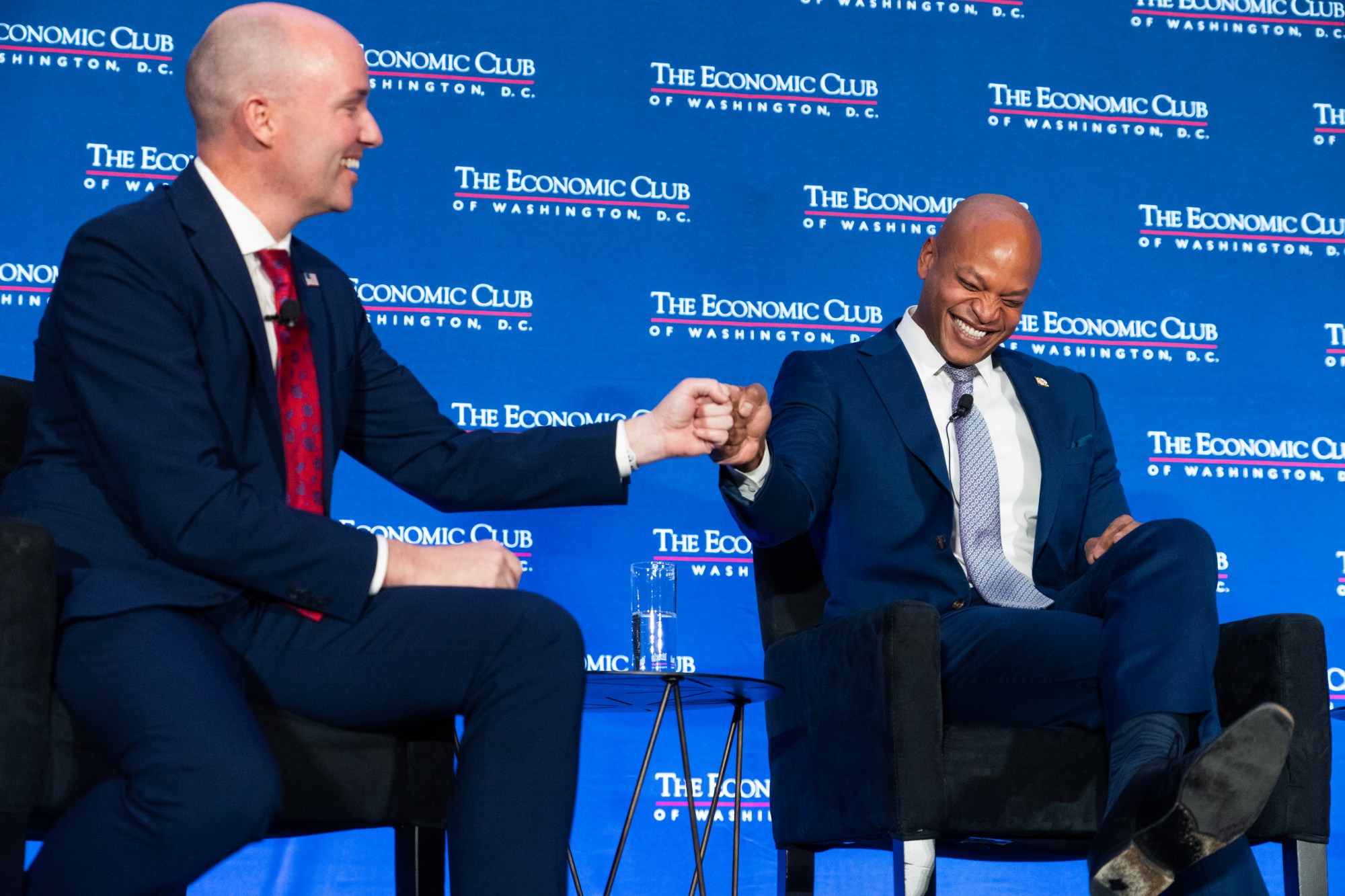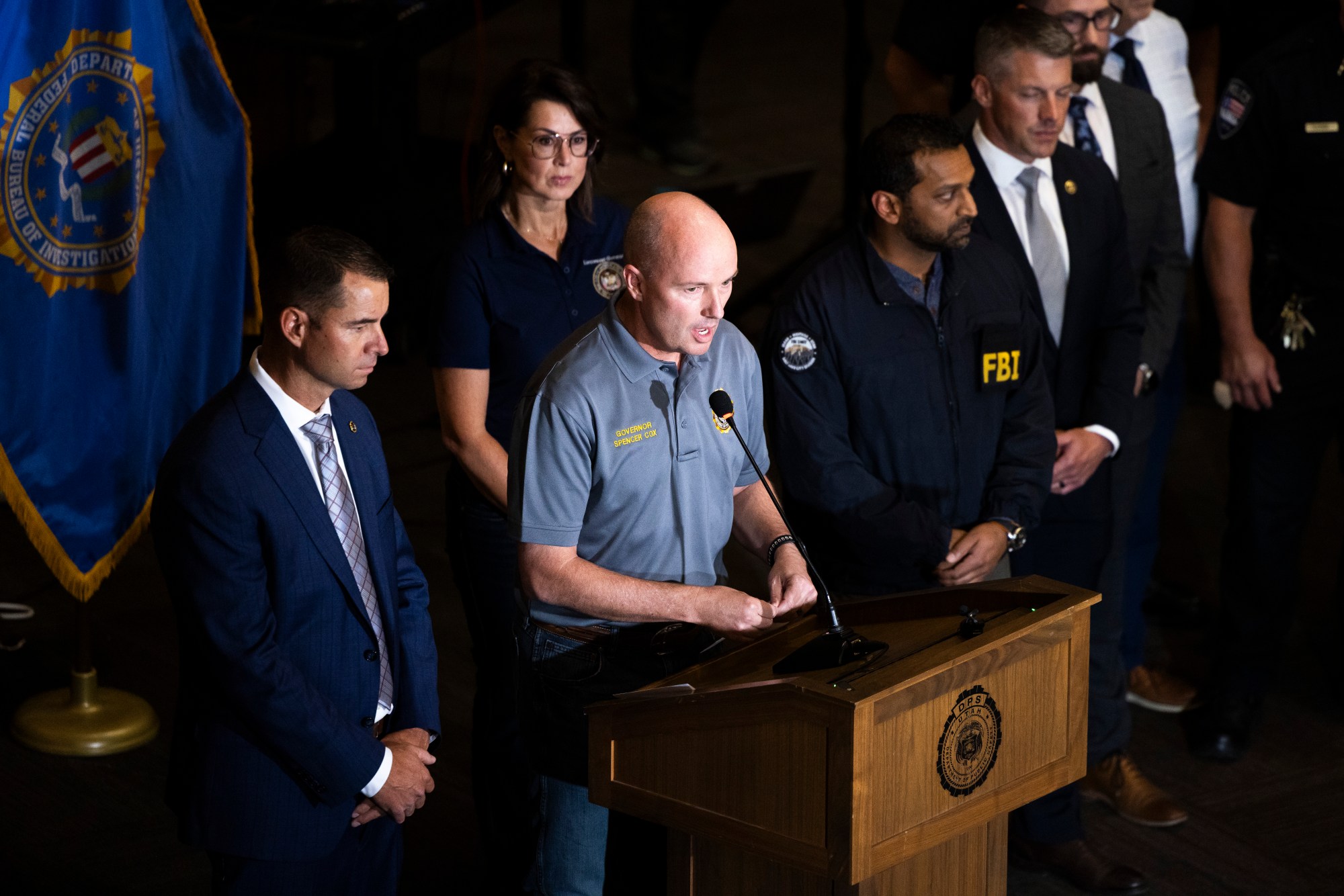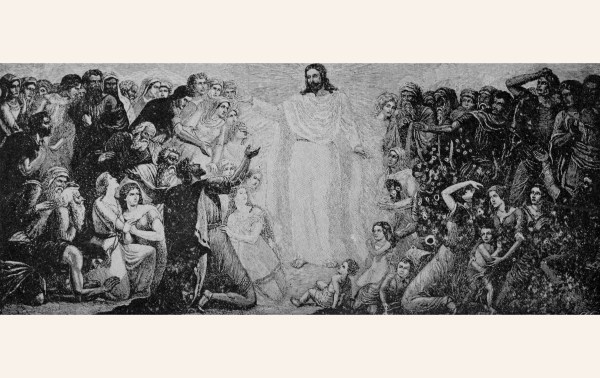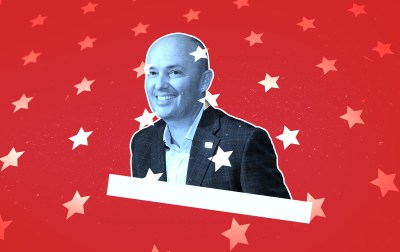LOGAN, Utah—Three weeks after Spencer Cox was thrust onto the national stage in the wake of the assassination of Charlie Kirk at Utah Valley University, Utah’s Republican governor is backstage preparing to do exactly what Kirk was doing when he was murdered in cold blood: speak at a Turning Point USA event on a college campus in Utah.
For Cox, his fellow speakers, and the 6,000 people filling the basketball arena at Utah State University on September 30, participating in the event where Kirk was scheduled to speak isn’t just a way to honor a man killed in an act of political violence. It’s also a simple act of defiance.
“If we stop doing certain things, then we lose a little bit of our free speech,” Cox tells me during an interview before the event, conducted under heightened security. Drones hover outside the venue for surveillance, and it takes a long time for thousands to pass through metal detectors to enter the arena. Cox says his administration and law enforcement are working on ways to ensure outdoor events aren’t off the table in the future, such as using drone technology for better surveillance and conducting better threat assessments.
Earlier in the day, a campus building was evacuated so a bomb squad could detonate a suspicious package, but the September 30 event goes off peacefully. The greatest controversy outside the arena is a handful of left-wing protesters carrying signs—including “VILE BIGOT KIRK ROTS IN HELL” and “Don’t need a Weatherman to know which way the wind blows” (the slogan of the 1970s left-wing terrorist organization Weather Underground)—but the agitators are confronted by Kirk supporters wielding nothing more than words.
In the weeks since the Kirk assassination, Cox has been widely praised for rising to the occasion in the wake of a national tragedy that occurred in his state. In a pair of press conferences following the assassination, the Utah governor spoke with moral clarity about both the human tragedy of the murder of a young father and how it struck at the foundational rights of all Americans. Cox pointed to Kirk’s willingness to engage in debate and Kirk’s own words imploring Americans to forgive and eschew violence as an example to live by.
Part of what made Cox’s remarks so remarkable was what he didn’t say. He dispensed with the platitude that it’s a given that America’s brightest days are ahead. He didn’t pretend to be the leader—or that there is any leader—who was going to save us.
“This is a watershed in American history,” Cox said at a press conference on September 12. “The question is: What kind of watershed? And that chapter remains to be written. Is this the end of a dark chapter in our history, or the beginning of a darker chapter in our history?”
“History will dictate if this [assassination] is a turning point for our country,” Cox said, “but every single one of us gets to choose right now if this is a turning point for us.”
In other words, Cox rejected the savior politics that has been dominant for the last two decades. There was no imperial declaration that “I alone can fix it.” There was no messianic proclamation from Cox or his supporters that he was the one we’ve been waiting for. It was just a simple, small-r republican invitation to engage in the hard work of democratic politics.
And it’s a message that has resonated with a wide array of conservatives and liberals. “In a moment like this, what you do is just an expression of your character. When things are moving fast and you don’t really control the narrative, that’s when you really reveal yourself,” Yuval Levin of the American Enterprise Institute told The Dispatch. “I think that’s why he’s done well.”
“The thing that I was kind of struck by is that he’s the same,” Maryland Gov. Wes Moore, a Democrat, told The Dispatch. “Sometimes when the lights get bright, sometimes when the pressure gets heavy you watch how people shift. … In the case of Spencer, the lights have forced people just to realize that he is who he is—the poise, the heart, and I think the focus of being committed to his principles.”
Spencer Cox, now 50, got his start in politics with a series of roles in local government, including mayor of his hometown of Fairview, population of a little more than 1,200 people, when he was just 30. Cox had returned home to work in his family’s telecom business after serving as a missionary in Mexico for the Church of Jesus Christ of Latter-day Saints, following his wife to Utah State University, and then turning down an offer from Harvard Law in favor of the Washington and Lee University School of Law.*
“I didn’t want to have a lot of debt,” Cox tells me. “If I went to Harvard, I would have to work in New York or D.C., someplace like that. There was a chance we’d want to come back [to Utah].” Cox also felt called by God to reject Harvard: “I was in church one day, and we had a lesson in the Old Testament, and there was a story in there about someone who was kept from great honor and great wealth. And it spoke to me: That’s not where I’m supposed to be. So I was one of those weird ones that told Harvard no.”
Cox had served less than a year in the Utah Legislature when he was tapped by then-GOP Gov. Gary Herbert to fill a vacant position as lieutenant governor in 2013. In the Legislature, Cox was quickly “recognized as a real workhorse, someone who actually can put pen to paper to draft legislation, and can actually understand budgets,” Paul Edwards, who served as Herbert’s deputy chief of staff, told The Dispatch.
Edwards, who now serves as director of the Wheatley Institute at Brigham Young University, said Herbert was impressed by his interactions with Cox during a wildfire crisis and Cox’s willingness to speak out against the corruption of a Republican attorney general. When Cox ran for his first term as governor in 2020 with Herbert’s backing, he defeated former GOP Gov. Jon Huntsman, who had served as Donald Trump’s ambassador to Russia, 36.2 percent to 34.8 percent in a multicandidate primary.
Long before the tragedy at Utah Valley University, Cox had been trying to set an example of engaging in politics in a better way. During his tenure as chairman of the National Governors Association in 2023, Cox launched an initiative called Disagree Better. But unlike many civility-mongers, Cox emphasizes the point of Disagree Better isn’t to avoid hot-button issues or to place a desire to be inoffensive above all else.
“We didn’t want this to just be, ‘Hey, we should be nice to each other’ because that’s not what it’s about at all. We chose Disagree Better because the first word is disagree,” Cox said last month at an event at Notre Dame with Democratic New Mexico Gov. Michelle Lujan Grisham. “People who did debate in high school or college are much less polarized than the rest of the country. We need to invigorate debate again. Let’s get in there and argue about abortion. Let’s get in there and argue about immigration.”

Through Disagree Better, Cox brought Supreme Court justices Amy Coney Barrett and Sonia Sotomayor together for a discussion in 2024. Cox himself cut ads with Democratic governors, including Moore of Maryland, about what it means to disagree better. “There are certain issues that Spencer and I have had deep disagreements about,” Moore told The Dispatch. “But it doesn’t matter. We’re still great friends.”
Cox is indeed deeply conservative in many respects. For example, he signed a law banning abortion clinics in 2023, and in 2020 he sparked controversy when he said: “I truly believe that at some point in the future, future generations will look back … at abortion the way we look at slavery. It will go down in history as one of the greatest travesties in the history of humankind.”
He declined to apologize for the remarks even though he faced pressure to do so. “I have always tried to be a voice for the most vulnerable in our society, those facing intergenerational poverty, refugees, the LGBTQ community, our multicultural communities—and yes, the unborn,” he said in a follow-up statement. “I also included in my response that our party should do more to support single mothers, pregnant women and children facing poverty and trauma. I continue to be unapologetically pro-life.”
Cox has characterized the abortion debate as a conflict of first principles while opposing the demonization of those who hold a different view. “People who believe in abortion rights are not evil people, and we should not treat them as such,” Cox said in 2022 following Dobbs decision overturning Roe v. Wade. “These are very deeply held and personal beliefs, and I would hope that my conservative friends would recognize that we all also believe in bodily autonomy.”
“He is a deeply decent person who is a traditional Republican, a very conservative guy, and ultimately thinks that conservative politics should be a politics of persuasion, and therefore a politics that tries to win everybody, and I think that’s an extension of his own personality and temperament,” AEI’s Levin told The Dispatch. Cox got to know Levin after inviting him to discuss his book about institutions, A Time to Build, with fellow governors. Cox selected Levin’s book on the Constitution, American Covenant, for the book club he runs with his senior staff. Cox quoted the latter book during his September 12 press conference.
“What I would associate with his style is also, in some ways, a Utah style, which is to deal with very divisive problems by bringing people together in a room and negotiating,” said Levin.
Despite Cox’s generally conservative outlook, his Utah style of politics has plenty of detractors on the right, including a significant share of Utah Republicans. At the TPUSA event at Utah State University on September 30, Cox faced those detractors head-on.
Outside the arena, opponents of Cox are holding posters with a March 2022 Charlie Kirk tweet that said: “Utah Governor Spencer Cox should be expelled from the Republican party.” Kirk posted the tweet in response to news that Cox would veto a bill requiring high school and middle school sports teams to be segregated by sex.
Inside the arena, more than a few attendees have had the 2022 Kirk tweet printed on T-shirts, and when TPUSA moderator Tyler Bowyer first introduces Cox, loud boos erupt from the audience. When Bowyer cuts off the boos by noting that there would be time for questioning and debate in the spirit of Charlie Kirk, the audience erupts with even louder applause.
During the Q&A, the first question from a student is directed to Cox about Kirk’s tweet and Cox’s 2022 veto. Cox highlighted his broader record on transgender issues—including signing laws banning transgender surgeries and hormonal treatment for minors and requiring locker rooms and bathrooms to be segregated by sex—but he vetoed the 2022 transgender sports bill for several reasons explained in a 2,100-word letter he wrote at the time.
Cox was worried the ban would be enjoined by a court—which is what happened initially after the Legislature overrode his veto—and hoped instead that a commission of experts could keep students off teams where they’d have an unfair advantage or pose a danger to other athletes while providing inclusion for the tiny number of students who identify as transgender. In the entire state of Utah in 2022, there were only four students who identified as transgender playing sports, only one of whom was a male on a girls’ team, according to Cox’s letter. The small numbers were due in part to a rule requiring a year of gender transition treatments before a student was allowed to compete on a team other than one’s sex. Since Cox signed a ban on transgender treatments for minors, there haven’t been mixed-sex athletic teams in the state.
“I would have loved to have had this debate together” with Charlie Kirk “three years ago when this happened, because I think he would have understood me better,” Cox says during the TPUSA panel. “I don’t think he would have agreed with me, though. I think he would have still been upset with me.”
Asked if he’s evolved at all on the transgender issues, Cox says he could do a better job of loving individual people while not shying away from his disapproval of certain conduct or policies: “We can love somebody and still hold them accountable for what we think is wrong, because we should be very up front about that. I haven’t always been that way, and I’m trying to be better.”

Before the event, I ask Cox what it means to disagree better about transgender issues. “It’s really hard,” he replies, saying it’s even harder than gay rights issues. But he points to how he and the Legislature handled the ban on transgender surgeries and hormones for minors as an example. “I invited the legislative leadership and the people who would be running those bills to the governor’s mansion. And then I invited some families with transgender youth in them to come just to get to know each other. I wanted us to see each other as human beings, knowing this was going to be hard. There was no agenda,” Cox says. When the debate occurred in the Legislature, there was a “different tone, there was respect, there was true compassion and understanding. The Legislature put aside a not insignificant amount of money for therapy for kids who would not be able to now access these medications, and that was something.”
Cox’s 2022 veto is not the sole reason he has detractors on the right. Former South Dakota Gov. Kristi Noem (the current Department of Homeland Security secretary) vetoed a similar bill for similar reasons in 2021 and remains in good standing with the MAGA base.
In the wake of the Kirk assassination, Cox has faced criticism for acknowledging political violence is not relegated to one political group. “The idea that speech is violence and violence is speech—that is not coming from the right,” Cox said during the September 30 panel, while still noting that: “There are violent people on the far right.”
But the most significant rift between Cox and the MAGA base has been his relationship with Donald Trump, which was rocky until recently.
“Obviously, Trump is popular in Utah, and I think Cox’s first instinct was to be pretty wary of Trump’s style,” Levin said. “But I think he also—as any governor would—wants to be on good terms with the leader of the party and then the leader of the country.”
Cox declined to endorse Trump in 2016 and 2020, and he said on July 11, 2024, (a few weeks after defeating a MAGA primary challenger by 9 points): “I’m not going to vote for either presidential candidate this year. I’ll write somebody in, as I’ve done in the past.” Trump was shot three days later. That incident prompted Cox to endorse Trump. “I was grateful to see the President say some things that he’s never said before. In the moments after that, in the statements that he released, and in parts of his speech last night, the former president talked about the need to lower the temperature and unify our country,” Cox said at a news conference shortly after the shooting. “We will still have lots of disagreements, I’m sure.”
Cox’s relationship now with Trump is “incredibly positive. He reaches out to me. We talk about things,” Cox tells me. “He said he supported me 100 percent. We don’t agree on everything, but we have a very warm relationship.” Asked about his biggest disagreements with Trump, Cox replies: “The tariff issue is one where I’ve said very publicly: Everything I learned in college tells me that this is a bad idea, but I hope it works.”
“He understands we have very different personalities,” Cox adds, pointing to Trump’s remarks, at the Charlie Kirk memorial service, that he hates his enemies. “I think he knows that I practice an ethos of love my enemies and try to engage with them.”
But Cox disagrees with Trump on several policy issues, too. Given his emphasis on the importance of debate, I asked Cox what he makes of the Trump-appointed Federal Communications Commissioner Brendan Carr threatening broadcast licenses over political speech? “It’s a huge mistake to use government to try to throttle speech,” Cox replies. “I’m always wary of doing something that I would hate the other side doing to us, and that’s a perfect example.”
Shortly before Cox and I spoke, Trump said in a speech to top military brass that he would use the military to target the enemy within in major U.S. cities. Asked about that comment, Cox says: “We called out the National Guard when there was a riot downtown and violence downtown [in Salt Lake City], so I think there is a time for that. I also believe that there … should be a divide between kind of daily law enforcement versus military. That’s an important distinction that we’ve made in our country for a long, long time.”
Cox does not plan to run for reelection as governor in 2028, but he has been quick to shoot down any notion that his friendlier relationship with Trump means he has presidential ambitions. In a September 28 appearance on 60 Minutes, Cox said the “thought of running for president makes me nauseous. I have no interest in that,” correctly adding that even if he wanted to: “The way we select our candidates makes it almost impossible for someone like me to have an opportunity.” When we sat down two days later, I asked Cox if he could categorically rule out running as a Republican or an independent. “I can rule that out categorically, yeah,” he replies. “Short of, you know, divine intervention or something crazy like that, I have no interest. I mean that sincerely. But I would love to help someone who really does have the stomach for that job. If there’s an opportunity to help again with this message and to help depolarize our country, I’m all in.”
Turning back to the question Cox posed right after the Kirk assassination—that this moment in American history could be the end of a dark chapter, or the beginning of an even darker chapter—Cox suggests it’s still too early to say which direction we are heading. “Sunday was a really tough day for people of my faith,” Cox says two days after a mass shooting targeting a Mormon church in Michigan. “I just felt, again, gutted and horrified, the same feeling I had three weeks ago—that kind of lump in your throat and that pit in your stomach.”
Yet, Cox remains hopeful. “People are desperate for something better,” he says. “They’re waking up to our awful situation, and they’re hopeful that the people will find their better angels.”
Correction, October 8, 2025: This story has been updated to reflect the correct law school Spencer Cox attended.







Please note that we at The Dispatch hold ourselves, our work, and our commenters to a higher standard than other places on the internet. We welcome comments that foster genuine debate or discussion—including comments critical of us or our work—but responses that include ad hominem attacks on fellow Dispatch members or are intended to stoke fear and anger may be moderated.
With your membership, you only have the ability to comment on The Morning Dispatch articles. Consider upgrading to join the conversation everywhere.